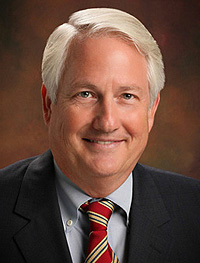Maryland Insurance Commissioner Al Redmer Jr. will leave his regulatory role and step into his new position as executive director of Maryland Auto Insurance on Monday, bringing with him a legacy as Maryland’s longest serving insurance commissioner.
Maryland Auto Insurance, based in Baltimore, was established in 1972 by the state and provides insurance to drivers who are unable to obtain coverage from standard carriers. Redmer is set to enter the company at a tumultuous time as the state continues to navigate the COVID-19 pandemic, but he says he’s prepared for the challenge.
“I learned a long time ago, but it’s been reinforced during our response to COVID-19, that at times like this, you have to be proactive,” he says. “You have to be responsive, and not just responsive, but responsive with a sense of urgency, with laser focus.”

Redmer was reappointed as Maryland Insurance Commissioner by Governor Lawrence J. Hogan Jr. in January 2019 after serving two previous terms as commissioner with the Maryland Insurance Administration from June 2003 to October 2005 and from January 2015 to May 2019. Hogan announced earlier this month that he has appointed Kathleen Birrane to replace Redmer for the rest of his term, set to end May 30, 2023.
Clear and consistent communication is a strategy Redmer says he aimed to employ during his time at the Maryland Insurance Administration, and it is one he hopes to continue in his next venture at Maryland Auto.
“I’ve developed over the years a passion for customer service,” he says. “I always err on the side of having an open, honest dialogue, where differences of opinion and disagreements are actually preferred as long as it’s done in a respectful way. I’m a big fan of transparency. Everybody needs to know what we’re doing and why we’re doing it and how we’re doing it.”
This strategy will become particularly important as the state continues to deal with the coronavirus, he says. Maryland has so far seen a total of nearly 35,000 confirmed cases, with nearly 1,700 confirmed deaths.
“I mean, this is going to have a long tail,” Redmer says. “Society in general is going to be dealing with the financial challenges associated with COVID-19 for many months down the road.”
Maryland in particular has paid 327,649 of unemployment claims received during the pandemic, as well as 56,000 Pandemic Unemployment Assistance claims since May 9, totaling more than $165 million in relief, according to a Maryland Department of Labor press release.
“Naturally, as folks have financial challenges, some of the bills do not get paid,” Redmer says. “Some of them are going to be car insurance.”
As Redmer predicts this will likely lead to a spike in uninsured drivers, as well as carriers seeing a deterioration of their book of business due to insurance cancellations in some cases, he sees this as one of his biggest challenges in his new role at Maryland Auto.
“It’s going to be a challenge for the entire state,” he says.
Another challenge Redmer anticipates within the auto insurance market is a rise in insurance fraud on the back of the pandemic.
“I am concerned that history will repeat itself,” he says. “When folks have financial challenges and they get desperate for money, oftentimes they do things that are illegal, and historically, insurance fraud has spiked during and after periods of financial challenges.”
In the face of these challenges, Redmer says he plans to work with Maryland Auto’s stakeholders to identify all of the needs that could arise in the wake of the coronavirus crisis, find solutions and mobilize its team to respond. Mostly, he plans to handle any difficulties that arise in the same way he always has, with transparency and consistent communication, he says.
“We’re going to handle it the way we handle everything else,” he says. “These are going to be issues that aren’t just Maryland Auto issues. These are going to be societal issues. These are going to be government issues. So we’ll be working with our stakeholders in the producer community, the Motor Vehicle Administration, the state legislators, and together, we will put together a plan to address some of these challenges that are going to be coming over the next couple of months.”
Indeed, Redmer says addressing the challenges that follow disasters is unfortunately nothing new to him. Three months after he became insurance commissioner at the Maryland Insurance Administration in June 2003, Hurricane Isabel hit the state. The Insurance Services Office reported in October 2003 that while Virginia sustained the greatest insured losses due to the hurricane, it was closely followed by Maryland, including Washington D.C., at $410 million in insured losses.
A few months after Redmer’s second appointment in 2015 were the Freddie Gray riots, with The Maryland Insurance Administration reporting in August 2015 that insurance companies paid $12.9 million in claims stemming from civil unrest in Baltimore linked to Gray’s April death.
Add to that the July 2016 flash flooding in Ellicott City, which devastated the town’s historic center and was dubbed a 1-in-1000 year event, and Redmer says the insurance administration has had its share of experience in responding to the effects of disasters.
“Disasters are disasters. They’re all a bit different,” he says. “We’ve got a great team in place, and everybody responded admirably through very difficult circumstances.”
Beyond the administration’s disaster response, Redmer says there are many moments he is proud of as he reflects on his time as insurance commissioner.
“Whatever we were supposed to do, we did it. We were very responsive and did it efficiently,” he says. “We created a very consistent and reasonable regulatory environment. We were known for that prompt, efficient service.”
One of the accomplishments he is most proud of, however, is the administration’s focus on the next generation of insurance professionals. At the prompting of the Maryland Insurance Administration, the Merrick School of Business at the University of Baltimore added a Risk Management and Insurance specialization to its B.S. in Business Administration program in 2019, making it Maryland’s only bachelor’s degree program offering specialization in risk management and insurance.
The idea for the specialization program came to him after speaking with the CEO of Maryland-based carrier Harford Mutual and learning that it was hiring several interns each year from Temple University in Philadelphia.
“Here, you have a Maryland-based company having to go to Pennsylvania to get interns because they don’t believe we’ve got the adequate supply here in Maryland,” he says. “I was embarrassed to learn, having been in the insurance business my entire adult life, that you could not get an insurance or risk management degree in Maryland.”
Redmer explained that he and Chief of Staff Zachary Peters “literally knocked on doors throughout the state of Maryland” seeking to address this challenge. After a couple of years, they finally found a willing partner in the University of Baltimore.
“While we do the day-to-day activities of regulating the insurance business, at the same time, we are trying to increase opportunities for the next generation of professionals that can come into the industry,” he says.
As Redmer prepares to leave his legacy at the Maryland Insurance Administration and begin his next chapter at Maryland Auto, he will be replacing another insurance veteran, Executive Director Mark McCurdy. McCurdy announced his retirement to the Maryland Auto Board of Trustees in 2019 after a 38-year career.
“I will be following a very successful leader in Mark McCurdy,” Redmer says. “It’s a great organization with very talented employees, and I’m very much looking forward to my next role.”
Was this article valuable?
Here are more articles you may enjoy.


 Preparing for an AI Native Future
Preparing for an AI Native Future  Florida Regulators Crack the Whip on Auto Warranty Firm, Fake Certificates of Insurance
Florida Regulators Crack the Whip on Auto Warranty Firm, Fake Certificates of Insurance  Munich Re Unit to Cut 1,000 Positions as AI Takes Over Jobs
Munich Re Unit to Cut 1,000 Positions as AI Takes Over Jobs  AI Needs Its Own Risk Class: Lockton Re
AI Needs Its Own Risk Class: Lockton Re 


